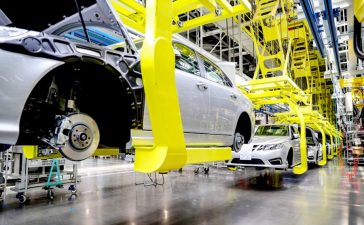At the end of November, the “Elmia Subcontractor” meeting was held with a focus on sustainability, energy efficiency, and increased competitiveness through cooperation. Leading Scandinavian experts gathered to discuss key questions facing the modern industry, including how the mobility solutions of the future can create new opportunities for today’s suppliers.
Among the experts present at the meeting were representatives from the NEVS company based in Trollhattan. Peter Dahl, program director at NEVS, highlighted new trends and the role of suppliers in industrial production, emphasizing the need for a different type of supplier in the future compared to traditional OEMs. NEVS plans to “dramatically increase production in 2026” and establish a presence in less restricted areas around the world, with a focus on autonomous and electrified vehicles, and joint services for sharing transportation.
The production of these future products and services require a different type of supplier than currently supplying the traditional automotive industry, one that can deliver small to medium quantities and quickly respond to requests. Additionally, these suppliers will need to significantly reduce carbon emissions in light of global environmental aspirations. The overall conclusion from the meeting is that the auto industry will need agile, easily accessible suppliers with a strong focus on sustainability in their production process – from energy-efficient production methods to the use of circular materials.
Table of Contents
NEVS plans to “dramatically increase production in 2026”
Peter Dahl presented the future of NEVS in autonomous and electrified vehicles on the main stage of Elmia Subcontractor. Although NEVS had an initial plan to produce electric cars as early as 2018, that plan did not materialize due to many reasons. Thanks to Peter Dahl’s participation in this meeting, we could hear that NEVS has new plans – and according to him, NEVS plans to “dramatically increase production in 2026 and establish a presence in less restricted areas around the world.”
A new type of supplier is needed for the auto industry of the future
And what NEVS plans to offer to the global market are primarily autonomous and electrified vehicles, and joint services for sharing transportation – that’s what they’ve been calling new for a long time. Now, these future products and services of theirs imply some revolutionary technical changes that extend far beyond the vehicle itself.
All of the above requires a different type of supplier than those currently supplying the traditional automotive industry. NEVS emphasizes that in the future they will only need suppliers who can deliver small to medium quantities and can quickly respond to requests. The previous big suppliers such as Bosch, Magna, ZF, or Denso cannot fulfill this, because they are bulky systems that mainly produce large series of spare parts for the auto industry.
Environmental awareness in the supply chain
In addition to agility, future suppliers in the auto industry are expected to significantly reduce carbon emissions in light of global environmental aspirations. So for Scania this means, for example, that the supply chain must be carbon neutral by 2030, which will consequently affect suppliers who currently have processes that generate a lot of carbon dioxide – energy consumption is, after all, the main negative when in regarding the production process.
Suppliers of the future
The overall conclusion from this meeting is that in the future the auto industry will need agile, easily accessible suppliers with a strong focus on sustainability in their production process – and this can be anything from energy-efficient production methods to the use of circular materials.











